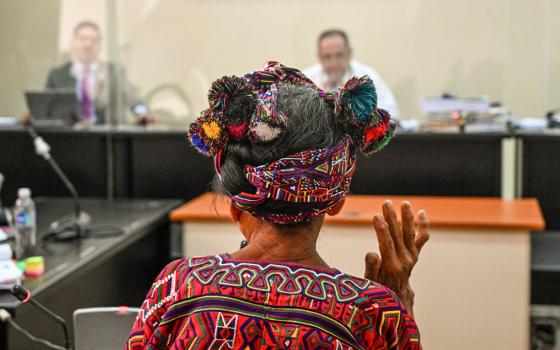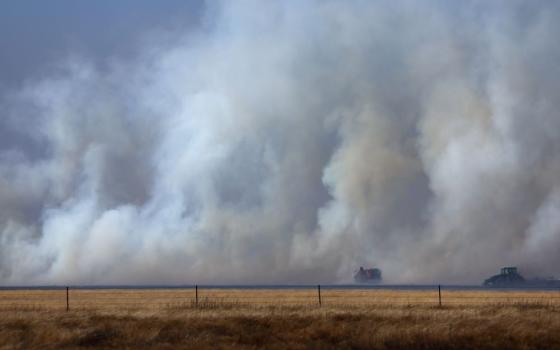The 48 prelates from Africa attending the worldwide meeting of Catholic bishops on family are widely working together to bring a similar message to the discussions focused on sharing their lived experience on the continent, Malawi's representative to the meeting has said.
“We are bringing the same message," said Archbishop Thomas Msusa, head of the Blantyre archdiocese and vice chairman of east Africa's regional bishops' conference. "Let us live proudly the heritage of what we have received: the Christian family."
"Challenges are there," said Msusa. "We have to find pastoral responses to the challenges."
"We have -- as bishops, priests, religious -- to be close to our people," said the archbishop. "We should not be foreign because we belong to family."
"We should be so close to our people," he said. "The example is our pope. People would like to touch him. That’s what even our laypeople want. They want to see us, they want to see us teaching. They want to see us be close to the family, just to encourage them."
Msusa, whose archdiocese is near Malawi's southern border with Mozambique, was speaking in an NCR interview Thursday on the sidelines of the Oct. 4-25 Synod of Bishops.
The interview also saw the archbishop speak about his own remarks to the synod meeting, how he sees the question of whether the church should use more inclusionary language towards gay people, and his hopes for Pope Francis' November visit to three African countries.
Besides leading his own archdiocese, Msusa, 53, is vice chairman of the eight-country Association of Member Episcopal Conferences in Eastern Africa. He is also a member of the Missionaries of the Company of Mary, commonly known as the Montfort Missionaries, and a convert to Catholicism from Islam.
The archbishop said he had used his 3-minute speech to the some 270 prelates gathered at the synod to address the question of young people who are afraid of the commitment of marriage.
“For us, in Malawi, we see it as normal," said Msusa. "Even the bishops and the priests, when they are supposed to be ordained there is also fear."
"Even when you are appointed bishop, there is also fear," said the archbishop. "Sometimes, even, you refuse. This is a normal reaction because they know that marriage and family life is a commitment."
"What is needed for us in Malawi is catechesis -- teach young people to see married life as a vocation," he said. "It is a vocation; it is a call. And we have to be open really to the young people to work on them, just as the missionaries did."
Msusa suggested that more lay persons could be trained in accompanying young people who are considering marriage, so they can "see family life as a gift from God."
Comparing marriage preparation to the preparation priests and religious receive before taking their vows, the archbishop said: "Just as a vocation to priesthood, to religious life ... we should do the same for married life."
"It’s a sacrament," said Msusa. "Young people should be trained to appreciate this, not [think of it] as a natural thing that once you are 30 or 40 you have to marry. But you have to be educated; you have to be informed."
Msusa said he hoped that at the end of the synod, Pope Francis would "affirm those who are living really faithfully the married life and family life." The archbishop also said he hoped the pope would "challenge the bishops, the priests, the lay people to let us continue to evangelize, to bring the faith."
"The challenge is lack of faith," said Msusa. "Those who have faith, even if there are challenges, they live together."
"For me, the most important thing is this new evangelization --- this taking Christ to the people," he said. "We should not be so closed. We should be touched by the people, like Pope Francis -- touched by the prisoners, touched by the sick people, touched by whoever."
Asked about one conversation known to be taking place at the synod -- whether the church should use more inclusionary language when speaking of gay people -- the archbishop said Catholic prelates should be pastorally close to gay people but clear about church teaching.
"Pastorally, we have to be very sympathetic with them," said Msusa. "But according to the teaching of the church, we don’t see us blessing" same-sex unions.
"In our Christian heritage we received from the missionaries, there is nothing of that inclusive language," said the archbishop. "And there’s a proverb in Africa that says we have to really be careful because they say: ‘We shouldn’t be so quick to destroy the fence before understanding why that fence was constructed.’ "
"We shouldn’t be afraid to tell the truth, even if sometimes it is painful," said Msusa. "That is what St. Paul tells Timothy: Tell them, whether they accept it or not. But you have to tell them."
Francis will be visiting three African countries from Nov. 25-30: Kenya, Uganda, and the Central African Republic.
Msusa said that people in Malawi are "very proud" that the pope will be visiting their continent, even if he will not make it to their country.
"We see the pope as appreciating the faith which is in Africa," said the archbishop. "We are also very happy to see that it is just affirming the way we live. So, we thank the pope for coming to Africa because so many people are longing, really, to see him."
“Coming to Africa is a sign that the Christian heritage is lived very well,” said Msusa, citing Pope Paul VI's trip to Uganda in 1969 to affirm the faith there.
The archbishop said that trip, the first of a pontiff to the continent since the early church, saw Paul tell the Africans that after years of outside missionary activity they were ready to "become missionaries to ourselves."
"But not only to ourselves," said Msusa. "Now we have to go out, really to live our faith with others."
"We have grown now, we are mature now," he said. "We can really give ... our faith to other people.”
[Joshua J. McElwee is NCR Vatican correspondent. His email address is jmcelwee@ncronline.org. Follow him on Twitter: @joshjmac.]




